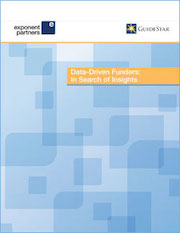Resources
CNJG's website features resources from 77 philanthropy supporting organizations, their 7,000+ grantmaking foundation members, and colleague philanthropic partners. There are several different ways to search the resource library. Using the filters on the right side of this page, you can search by resource type, funding area, topic, or audience. For example, if you are looking for a case study, select that resource type, then filter by funding area, audience or topic to refine the results. Please note, the search box below only searches resources. If you're looking for news or events, use the search box in the upper right corner to search the entire site.
CNJG family foundation members can also search for additional resources through our members-only portal to the National Center for Family Philanthropy Knowledge Center.
- resource provided by the Forum Network Knowledgebase.
Search Tip: Search with " " to find exact matches.
CNJG's Storify content from their Signature Events.
For this suite of resources, GrantCraft captured the wisdom of philanthropic leaders who have participated in multi-party advocacy collaboratives and conducted a literature scan of how foundations talk about advocacy-focused collaborative work.
The William and Flora Hewlett Foundation has had a long-standing commitment to increasing the effectiveness of grantmaking organizations, a commitment reflected in its Philanthropy Grantmaking Program. In 2015, the Foundation commissioned Harder+Company Community Research, in partnership with Edge Research, to conduct a field scan to inform its own strategies in this area as well as those of other organizations working to increase philanthropic effectiveness.
These profiles highlight the economic importance, diversity, and community impact of the charitable sector in each of the 50 states.
These resources are from CNJG's 2016 Annual Meeting & Holiday Luncheon where the topic of shifting demographics was explored.
Philanthropy and the Social Economy: Blueprint 2017 is an annual industry forecast about the ways we use private resources for public benefit.
The William Penn Foundation commissioned a study to move beyond the anecdotal and see if and how students benefited from being involved in some of its grantee arts programs. The research by WolfBrown, working with Johns Hopkins University, showed that participating in the arts help students develop traits that contribute to later success in life. Younger students especially showed measurable growth in characteristics like tolerance for other points of view, an understanding that hard work can develop their knowledge and abilities, and their motivation to achieve.
The Funders Collaborative was an innovative partnership supported by 14 local and national foundations. The collaborative supplemented the programs and grantmaking of its member foundations by working with community organizations, the business sector and public agencies to encourage collaboration, planning and investment “beyond the rail.”
State and National disaster relief organizations and resources for funders and individuals.
Based sardonically on Masterpiece Theatre, Washington Regional Association of Grantmakers’s Structural Racism Theater introduces the viewer to concrete examples of structural racism and implicit bias. It’s edgy, dryly humorous, “shareable,” and an incredibly different direction for WRAG. The first episode, "The Pernicious Compromise," focuses on the timely topic of the Electoral College and its connection to the Three-Fifths Compromise.
Based sardonically on Masterpiece Theatre, Structural Racism Theater introduces the viewer to concrete examples of structural racism and implicit bias in an edgy, social media-friendly way. In "Darkness in Emerald City," we look at the relationship between implicit bias and institutional racism.
Research shows that one of the greatest impediments to a prosperous future for all of Michigan's people is unequal access to resources. To help foundation leaders and their boards begin essential conversations about marginalized populations and determine the extent to which their organization's culture and grantmaking practices are aligned with a commitment to expanding opportunity in the communities they serve, CMF developed this discussion guide and self-assessment.
Foundation leaders have a unique opportunity to serve as powerful champions of their missions. Partnering with your grantees can amplify your impact. The following guide is designed to help you start having an honest conversation in the boardroom; a conversation about your foundation’s goals, approach, and, most importantly, vision for the future.
Daniel Kemmis explores the sometimes-fraught relationship between philanthropy and democracy in this updated report. Beginning with a wide-ranging stroll through the shared history of philanthropy and democracy, Kemmis examines the current post-Citizens United landscape and asks whether philanthropy can and should do more to strengthen the infrastructure and practices of democracy.
In the final session in Washington Regional Association of Grantmakers's Putting Racism on the Table series (2016), the W.K. Kellogg Foundation's Dr. Gail Christopher discussed the role of philanthropy in addressing racism and racial inequity.
In the fourth session of Putting Racism on the Table (2016), James Bell, founder and executive director of the W. Haywood Burns Institute, focused on mass incarceration.
In the fifth session in WRAG's Putting Racism on the Table series (2016), Manuel Pastor, Professor of Sociology and American Studies & Ethnicity at the University of Southern California, discussed the experience of nonblack racial minorities in America, the implications of demographic change, and the urgent need to invest in equity.
"Co-Creation" is a case study about the Connecticut Early Childhood Funder Collaborative, a project of the Connecticut Council for Philanthropy. The case study examines co-creation, an emerging systems change collaboration model which grew out of a funder-and-state partnership. This unique partnership led to the creation by executive order of a new and independent Office of Early Childhood, which was formally approved by the Connecticut State Legislature in 2013. The companion piece, "Taking on New Roles to Address 21st Century Problems," looks at co-creation from the perspective of a regional association of grantmakers.
In the third session of Putting Racism on the Table (2016), Julie Nelson, Director of the Government Alliance on Race & Equity, Haas Institute for a Fair and Inclusive Society, focused on implicit bias.

